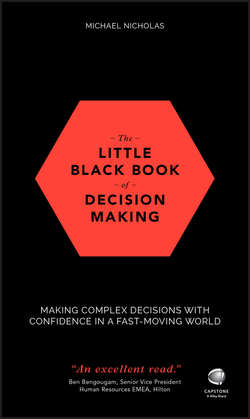Читать книгу The Little Black Book of Decision Making - Nicholas Michael - Страница 11
На сайте Литреса книга снята с продажи.
Part One
No Place for Old Dogs: New Tricks Required
1
Let's Get Real: We All Make Mistakes
Running on Instinct
ОглавлениеPsychologists use the term heuristics to describe the unconscious mental shortcuts that we take to arrive at judgments or solve problems. To date, dozens of them have been identified; hindsight bias being just one example. When we are faced with difficult questions, high complexity or ambiguity, or a need for high speed, heuristics can help us to find answers or solutions that would otherwise be beyond conscious reach. However, because they evolved to enable us to cope with an evolutionary past when we were living on the plains, hunting and gathering, the biases they introduce are often imperfect and may lead to terrible mistakes.
Mental shortcuts can even lead to inappropriate biases in life or death situations, as demonstrated by a study by Amos Tversky which looked at how the way that data is presented can affect doctors’ choices. All of the participants received the same data on the effectiveness of two interventions for lung cancer: surgery and radiation treatment. It indicated that radiation offered a much better chance of survival in the short term, but a lower life expectancy over the next few years.
For half of the participants the data was presented in relation to survival rates, whilst for the others it was provided in terms of death rates; for example, the statistics for the surgical treatment of 100 patients were as follows:
Clearly, from a mathematical/logical point of view, the two columns of data are exactly the same, yet 82 % of the doctors presented with the survival data recommended surgery versus only 56 % of those who were given the opposite perspective. Studies like this demonstrate the enormous influence that heuristics can have on our decision making; in particular, how difficult it is for us to divorce decisions from their emotional components.
Heuristics can be considered to be much like instincts. Animal instincts are easy to recognise; indeed, we assume that this is how animals do pretty much everything. As human beings, however, we generally prefer to think of ourselves as rational. We like to hang on to the evidence of our conscious experience, which suggests that our experience of the world is “accurate” and that we form beliefs and opinions based on the facts of the situation. Social psychologist Lee Ross called this conviction “naïve realism” – the conviction that we have the ability to experience events as they are. It enables us to justify any opinion as reasonable, because if it wasn't we wouldn't hold it! Sounds great, doesn't it? And it is completely wrong. The logic of this kind of thinking does not bear scrutiny, but that's okay because it's an easy choice not to investigate …
Конец ознакомительного фрагмента. Купить книгу
